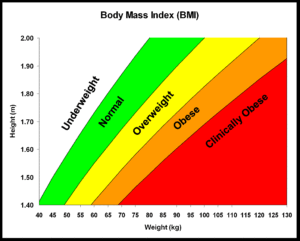What is the BMI (Body Mass Index)
What is the BMI (Body Mass Index)

via kidzworld.com
Today’s culture is seemingly all about health and wellness. Everywhere you turn, there is information about what you should eat and what you should avoid, the number of hours that you should spend exercising each week, the best types of exercise to do and virtually anything else that pertains to good health. Considering the fact that popular culture is virtually inundated with all of this information, as well as the overwhelming push to have a certain body type, you might think that most people would be slim.
However, more people are overweight now than ever before. In fact, the obesity rate in the U.S. is nothing short of alarming. Twenty years ago, there was much less focus on healthy eating or on obtaining a certain body type, yet far fewer people were overweight then than they are now. Today, It is not at all uncommon to see more overweight people than people who are at their ideal weight. Sadly, this is even true when it comes to young children.
One of the ways that health professionals measure a person’s boy fat is to calculate their body mass index, or BMI. Generally speaking, the BMI formula is used to determine the overall health of an individual when it comes to their weight. It is obtained by measuring the amount of body fat that a person has and then calculating that information to determine an overall percentage. Typically, anything between 25 to 30 is considered overweight, over 30 is considered obese and below 18.5 is considered underweight. Ideally, a person wants to have a healthy BMI that is between 18.5 and 24.9.
When it comes to measuring weight loss effectiveness, BMI is a much better measurement than standing on a scale.
While calculating BMI over a period of time can help people decide how many calories they should take in, it is important to note that this measurement should not be used for every individual. More often than not, it is considered to be the absolute benchmark for health. However, there are exceptions, just as there are exceptions to practically everything. There are times when a BMI calculation is simply wrong, and therefore does not present an accurate representation of the overall health of an individual. Some people may have especially high BMI calculations, yet they do not need to lose weight. Therefore, BMI calculations should be used with caution or not used at all in very young children, the elderly and pregnant women. They are also notoriously inaccurate for bodybuilders and long distance athletes. This is because these are special classes of individuals who may reflect an abnormally high body mass index even though they do not need to lose weight at the current time.
For the most part, body mass index is a very good indication of whether or not a person needs to lose weight. However, it is important to remember that there is no single formula that works well for everyone. It is important to use BMI calculations as one part of the equation and helping a person stay healthy. It should never serve as the only benchmark, but should help to provide a more complete picture of a person’s overall health. Only then can it be used accurately.





